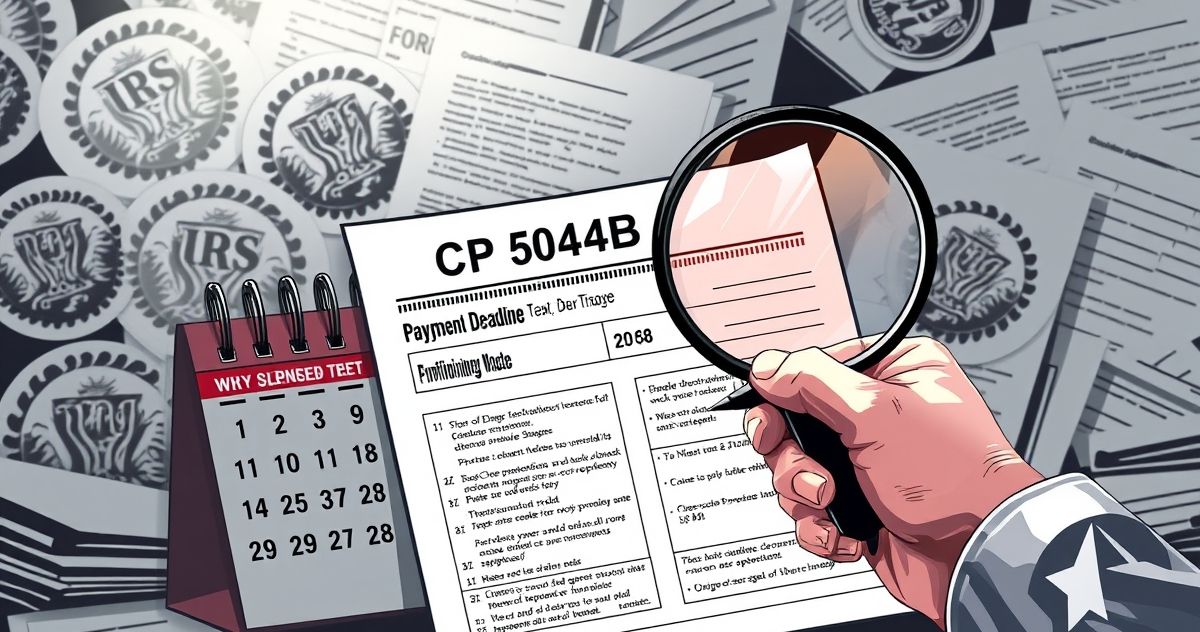Understanding the CP504AB Notice and Its Significance
The CP504AB Notice is an important notification issued by the Internal Revenue Service (IRS) to inform taxpayers that they have overdue tax liabilities. This notice serves as a formal warning that immediate action is required to avoid further financial repercussions. Essentially, the CP504AB Notice acts as both a reminder and a notice of potential enforcement actions if the outstanding tax debt is not resolved promptly.
What is the CP504AB Notice and Its Primary Purpose?
The CP504AB Notice is a tax-related document sent by the IRS when a taxpayer has not paid the balance owed on their taxes. The primary purpose of this notice is to alert taxpayers of the significant consequences that can arise from neglecting their tax responsibilities. It provides a final opportunity for taxpayers to settle their debts before the IRS enforces collection actions, such as wage garnishments or bank levies.
Key Features and Components
Understanding the structure of the CP504AB Notice can help taxpayers adequately address the issues presented. The notice generally includes the following components:
- Outstanding Balance: The notice specifies the total amount due, including the principal tax owed, interest, and applicable penalties.
- Payment Deadline: A specified date by which the payment should be made to avoid escalated collection actions.
- Payment Options: Detailed instructions on how taxpayers can settle their debt, whether through full payment, a payment plan, or other IRS-approved methods.
- Consequences of Non-Compliance: The notice outlines potential enforcement actions that the IRS may pursue if the debt remains unpaid, such as filing a federal tax lien.
Relevant Filing or Compliance Requirements
Upon receiving a CP504AB Notice, compliance with IRS regulations is crucial. Taxpayers are encouraged to take the following steps:
- Review the Notice: Ensure that the information on the notice is accurate, including the balance due and any prior payments made.
- Verify Your Tax Records: Cross-check the notice details with personal tax records to identify any discrepancies.
- Contact the IRS: If clarification or negotiation is needed, taxpayers should contact the IRS as soon as possible using the contact information provided on the notice.
- Pay or Arrange Payment: Prioritize settling the debt by making a full payment or setting up an installment agreement that aligns with personal financial capabilities.
Penalties or Consequences for Non-Compliance
Ignoring a CP504AB Notice can result in severe financial and legal consequences. The IRS has the authority to take various measures, including:
- Federal Tax Lien: The IRS can file a lien against a taxpayer’s property, affecting their credit score and ability to sell or refinance assets.
- Levy Actions: The IRS may initiate levies on bank accounts or wages, directly impacting financial stability.
- Interest and Penalties: Continued accrual of interest and penalties on unpaid taxes can significantly increase the total amount owed over time.
Importance and Significance in Tax Resolution
The CP504AB Notice plays a vital role in promoting responsible tax compliance and proactive tax resolution. By addressing the notice promptly, taxpayers can prevent further escalation of their tax issues. It also offers a chance to engage with the IRS, potentially leading to a manageable resolution and ensuring financial regulation is maintained.
Additionally, understanding and responding to a CP504AB Notice can assist taxpayers in mitigating risks associated with unpaid taxes, facilitating better financial planning and management.
Conclusion
In summary, the CP504AB Notice is more than just a notification of overdue taxes; it is a critical step within the IRS collection process that must be addressed seriously. By understanding its components and taking decisive action, taxpayers can navigate their tax obligations effectively and avoid dire financial consequences.

